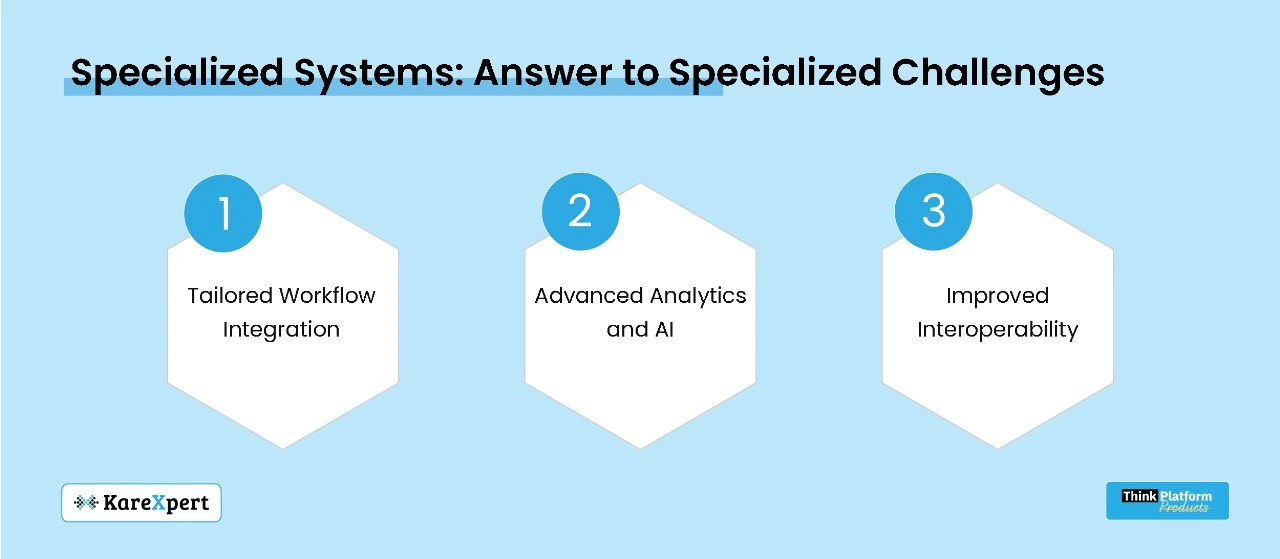Your Patients Deserve More: Why Generalized Systems Are a Hidden Threat to Specialized Care

Introduction: The Problem With One Size Fits All
Gone are the days when a generic system could handle the diverse needs of specialized departments within a healthcare environment. Be it ophthalmology, oncology, or cardiology, each specialty has specific solutions it needs to accurately diagnose, treat, and manage the patient. Generalized systems, while promoted as the ideal for a variety of workflows, typically create barriers for the distinct workflows and technical needs of specialized care. This article discusses why generalized systems undermine specialized care and why adapting specialized systems is not just a luxury but a necessity.
Generalist Systems: A Square Peg In A Round Hole
No Support for Specialty Workflows
Most generalized systems are developed to perform administrative functions like patient registration, billing, and general diagnostics. However, specialized departments require more tailored functionalities:
– Ophthalmology: Needs integration with cutting-edge diagnostics such as OCT (Optical Coherence Tomography) and slit lamp imaging.
– Oncology: Requires strong tools to schedule and monitor chemotherapy cycles or radiation schedules.
– Pediatrics: Needs growth charts, vaccination reminders, and pediatric-specific KPIs.
When systems are not designed to support these workflows, staff must use workarounds or rely on manual processes, leading to inefficiencies and mistakes.
Data Bottlenecks and Integration Barriers
Specialized practices depend on well-connected diagnostic instruments, laboratories, and other medical devices. Generalized systems often lack mechanisms to consolidate these data sources:
– Fragmented Patient Records: Missing information hinders decision-making.
– Shared Data Challenges: Difficulty in sharing data between internal teams or external specialists.
– Missed Opportunities: Inability to leverage advanced analytics or AI integrations.
Patients Are Harmed by Generalized Systems
Delayed Diagnosis and Treatment
Diagnostic tools cannot perform optimally with non-customized systems, delaying reporting and treatment.
Example: In ophthalmology practices, manual data entry of retinal scans can hinder workflows and increase the likelihood of errors, delaying treatment for conditions like glaucoma.
Compromised Quality of Care
Generalized systems fail to accommodate specific departmental needs, leading to:
– Generic Templates: Resulting in incorrect medication dosages.
– Lost Follow-Ups: Due to poor scheduling systems.
– Diagnostic Overrides: Mismanagement of abnormalities during diagnostic processes.
Reduced Patient Satisfaction
Patients in specialized care deserve accuracy, empathy, and excellent service. Long wait times, poor care, limited operation hours, and inadequate management lead to dissatisfaction, negatively impacting hospital quality.
Specialized Systems: Answer to Specialized Challenges

Tailored Workflow Integration
– Specialized systems are built to match department-specific workflows. For instance:
– Cardiology Systems: Integrate with ECG devices and stress test equipment, automatically populating patient records.
– Oncology Systems: Integrate surgical, radiological, and pharmacological data for comprehensive treatment planning.
Advanced Analytics and AI
Specialized systems include advanced analytics to predict patient outcomes, optimize treatment plans, and identify risks early:
– Predictive Analytics: Provides early warning signs of disease progression.
– Machine Learning: Enhances diagnostic accuracy through multi-source data analysis.
Improved Interoperability
These systems integrate effectively with other technologies and databases, enabling seamless data exchange:
Real-Time Updates: Patient records are updated instantly.
– Enhanced Cooperation: Specialists collaborate more efficiently.
– Continuity of Care: Patients receive uninterrupted, comprehensive care.
Why Specialized Systems Work: Case Studies
Integrating Advanced Imaging in Ophthalmology
– Transitioning from a general EMR to an ophthalmology-specific EMR yielded:
– 40% Reduction: In diagnostic time due to seamless integration with imaging tools like OCT and fundus cameras.
– Higher Patient Satisfaction: More efficient visits.
– Improved Analytics: Enhanced prediction of outcomes for diabetic retinopathy.
Comprehensive Oncology Care
An oncology center adopted specialized systems that connected chemotherapy planning tools, patient monitoring devices, and lab results:
– 30% Fewer Delays: Improved scheduling and resource allocation.
– Accurate Dosing: Reduced adverse drug reactions.
– Better Compliance: Personalized treatment plans improved patient adherence.
The Cost of Inaction
Financial Losses
– Generalized systems may appear cheaper initially, but long-term costs include:
– Higher Operational Costs: Due to inefficiencies.
– Revenue Losses: Dissatisfied patients are less likely to return.
– Legal Liabilities: Mistakes arising from system limitations.
Staff Burnout
– Manual data entry, fragmented workflows, and system errors contribute to:
– Higher Burnout Rates: Increased stress levels among staff.
– Turnover Issues: Difficulty retaining and recruiting staff.
Reputational Damage
Failing to invest in specialized systems risks the hospital’s reputation for excellence, particularly in competitive markets.
– Breaking Down Barriers to Specialized System Adoption
Cost Concerns
-Solution: Modular systems allow hospitals to adopt specialized features gradually, reducing upfront costs.
Training and Adoption
Solution: Vendors provide intuitive interfaces and robust training programs to ease the transition for healthcare staff.
Data Migration Challenges
Solution: Professional services from system providers ensure seamless data migration without loss or corruption.
Where Healthcare is Headed: A Specialization Escape
The healthcare sector is moving towards precision medicine, which requires:
– Operational Efficiency: Streamlined workflows.
– Improved Patient Outcomes: Tailored care plans.
– Empowered Clinicians: Tools that support specialized care delivery.
Specialized systems are more than advanced tools; they are the foundation of excellence, enabling healthcare professionals to provide personalized, high-quality care.
Final Thoughts: Your Patients Deserve Better
Generalized systems may have sufficed during rudimentary healthcare delivery, but they are inadequate for today’s specialized needs. By adopting specialized systems, hospitals can enhance patient outcomes, satisfaction, and financial viability.
It’s time to move beyond the one-size-fits-all approach. Your patients are unique, and your systems should reflect those differences.
